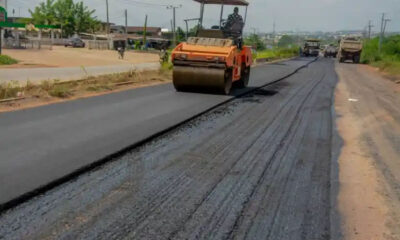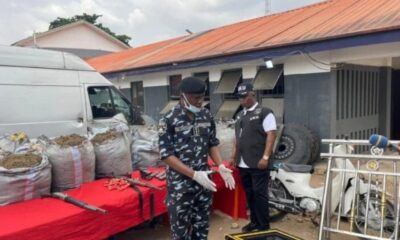News
DHQ tackles Katsina gov over claims military benefiting from terrorism

DHQ tackles Katsina gov over claims military benefiting from terrorism
The Defence Headquarters on Wednesday called on Katsina State Governor, Dikko Radda, to provide evidence to support his allegations against the military.
During an appearance on Channels Television’s “Politics Today” on April 5, 2024, Radda accused the military of aiding and profiting from terrorism in Katsina State.
In response, Maj. Gen. Buba Edward, Director of Defence Media Operations, stated that while the military would not engage in a war of words with the governor, they urged him to present his evidence to the military high command.
Edward said, “The attention of the Defence Headquarters has been drawn to a weighty allegation labelled against the Armed Forces of Nigeria by the Executive Governor of Katsina State, His Excellency Governor Dikko Radda. The governor granted an interview on Channels Television programme ‘Politics Today’ on 5 April 2024, alleging that the military is aiding and profiting from terrorism activities in Katsina State.
READ ALSO:
- Police arrest 8 notorious armed robbers in Kaduna
- Tension as policeman guns down colleague at popular Jos market
- Lookman scores stunning hat-trick in Atalanta vs Leverkusen Europa League final
“The AFN is hereby making it unequivocally clear that, it is subservient to all elected government representatives and, therefore, regards the relationship with utmost respect.
“In the light of the aforementioned statement of His Excellency, the Governor of Katsina State, the AFN elects not to trade words with the state governor but rather would encourage him to approach the military high command to substantiate his allegations. “
Buba stated that the military remained “unperturbed by such statements capable of demoralising or dampening the spirit of troops in operational theatres.”
“Rather, we will continue on the trajectory of conducting operations as well as working assiduously in the fight against terrorism.
“It is worthy of note to state that, the AFN led by the Chief of Defence Staff, General Christopher Musa OFR, has zero tolerance for indiscipline and any form of criminality in the conduct of operations across the country. It is for this reason that there are standing court martials to treat any form of misbehaviour by troops especially those that portray the military negatively to the general populace,” he said.
Buba said, “Overall, the Armed Forces is for Nigerians and as such citizens are urged to own it and also report any credible observed bad conduct within the ranks so that they can face the appropriate military justice system.”
DHQ tackles Katsina gov over claims military benefiting from terrorism
News
INEC Seeks N1.04 Trillion for 2027 Elections, Operational Needs – Amupitan

INEC Seeks N1.04 Trillion for 2027 Elections, Operational Needs – Amupitan
The Independent National Electoral Commission (INEC) has requested a total of ₦1.04 trillion from the Federal Government of Nigeria to fund off-cycle elections this year, the 2027 general election, and its operational activities in 2026, subject to approval by the National Assembly of Nigeria.
The request was made by INEC Chairman Prof. Joash Amupitan while defending the commission’s spending proposal before the Joint Committee on Electoral Matters of the National Assembly. Amupitan urged lawmakers to grant timely approval and release of funds, warning that delays could hamper preparations for upcoming elections.
According to the INEC chairman, the commission is seeking ₦873.778 billion for the 2027 general election and ₦171 billion for its 2026 operational activities. The 2026 allocation covers Federal Capital Territory (FCT) area council elections, by-elections scheduled for next week, and the Ekiti and Osun governorship elections slated for June and September.
READ ALSO:
- Alake: Killers of Mining Marshal Will Face Full Wrath of the Law
- Lagos Police Launch Manhunt for Suspect in Brutal Ajah Murder
- Lookman Shines as Atlético Madrid Hammer Barcelona 4-0
Breakdown of the 2027 Election Budget
The N873.778 billion earmarked for the 2027 general election includes:
- ₦379.748 billion for operational costs
- ₦92.317 billion for administrative expenses
- ₦209.206 billion for technology
- ₦154.905 billion for election capital costs
- ₦42.608 billion for miscellaneous expenses
For the N171 billion proposed for 2026 operations, Amupitan said:
- ₦109 billion would cover personnel costs
- ₦18.7 billion for overheads
- ₦42.63 billion for election conduct
- ₦1.4 billion for capital expenditure
He noted that the budget was prepared in line with Section 3(3) of the Electoral Act 2022, which mandates submission of election budgets at least one year before a general election.
Calls for Timely Fund Release and Dedicated Network
Amupitan criticized the envelope system of budgeting, describing it as unsuitable for INEC’s operational needs that often require urgent interventions. He appealed for a bulk release of funds, highlighting the need for a dedicated communication network to enhance accountability and transparency during elections.
“If we have our own network, Nigerians can hold us responsible for any hitch,” he said.
Lawmakers Back INEC’s Proposal
Senator Adams Oshiomhole argued that no government agency should impose the envelope budgeting system on INEC, emphasizing that full release of funds is critical for smooth election preparations. Similarly, House member Billy Osawaru called for the budget to be placed on first-line charge, allowing the commission access to all funds immediately.
Following deliberations, the joint committee approved a one-time release of INEC’s annual budget and pledged to consider increasing allowances for National Youth Service Corps (NYSC) members deployed for election duties. The proposed increase would cost ₦32 billion, equating to ₦125,000 per corps member.
Senator Simon Lalong, chairman of the Senate Committee on Electoral Matters, assured INEC of lawmakers’ support, pledging close collaboration to ensure a successful 2027 election. House Committee chairman Bayo Balogun also promised legislative backing but cautioned INEC against overpromising, citing prior misrepresentations about real-time uploads to the INEC Result Viewing (IReV) portal, which was never provided for in the Electoral Act but only in INEC regulations.
The approval of the commission’s budget and operational requests is expected to enhance election preparedness, technological deployment, and transparency ahead of the 2027 general elections, while addressing logistical and operational challenges that have hampered past polls.
INEC Seeks N1.04 Trillion for 2027 Elections, Operational Needs – Amupitan
News
Aso Rock Goes Solar as Tinubu Orders National Grid Disconnection

Aso Rock Goes Solar as Tinubu Orders National Grid Disconnection
President Bola Tinubu will fully disconnect the Aso Rock Presidential Villa from the national grid by March 2026 following allegations of electricity overbilling for power not supplied, the State House has confirmed.
The State House Permanent Secretary, Temitope Fashedemi, made the disclosure while defending the 2026 State House budget before the Senate Committee on Special Duties. He revealed that the solar mini-grid project at the Presidential Villa was completed in December 2025 and is currently undergoing technical testing ahead of a full transition to solar power.
Fashedemi explained that during the testing phase of the new solar installation, officials discovered what he described as significant overbilling by the electricity distribution company. According to him, the State House observed instances where it was billed for electricity that was not supplied and has begun reconciliation discussions to address what he termed “legacy liability.”
READ ALSO:
- 2026 Electoral Bill: Senate Explains Limits of IReV in Real-Time Transmission
- El-Rufai to Appear Before EFCC After Alleged Airport Arrest Attempt
- Four Sentenced to Death for Murder of Ahoada DPO in Rivers
The Villa is serviced by the Abuja Electricity Distribution Company (AEDC), which in February 2024 publicly listed several government agencies as debtors. At the time, AEDC said the Presidential Villa owed N923.87 million in unpaid electricity bills. Other major debtors included the Federal Capital Territory Administration (FCTA) and some federal ministries.
The Tinubu administration had earlier allocated N10 billion in the 2025 budget for the solarisation of the Presidential Villa through a solar mini-grid system. An additional N7 billion has been earmarked for the same project in the 2026 Appropriation Bill, bringing total allocations to N17 billion over two years.
Fashedemi noted that a similar transition to solar power at the State House Medical Centre in May 2025 has already demonstrated cost savings and reliability. He said the facility has operated almost entirely on solar energy and battery storage since then, with minimal reliance on grid electricity and no generator use.
He expressed optimism that by March 2026, the Presidential Villa would complete its transition and fully exit the national grid, relying primarily on renewable energy for its electricity needs.
The development aligns with broader efforts to promote renewable energy adoption in Nigeria, reduce public sector energy costs, and address concerns over electricity billing transparency. If fully implemented, Aso Villa will operate largely on solar power supported by battery storage systems, significantly reducing dependence on grid supply and diesel generators.
Aso Rock Goes Solar as Tinubu Orders National Grid Disconnection
News
2026 Electoral Bill: Senate Explains Limits of IReV in Real-Time Transmission

2026 Electoral Bill: Senate Explains Limits of IReV in Real-Time Transmission
The Nigerian Senate has declared that genuine real-time transmission of election results can only be achieved if the Independent National Electoral Commission (INEC) adopts a full e-voting system, clarifying ongoing debates surrounding the review of the 2026 Electoral Bill.
Chairman of the Senate Ad-hoc Committee on the Review of the 2026 Electoral Bill, Adeniyi Adegbonmire, made the clarification during an interview on Arise News Channel on Thursday.
According to him, the INEC Result Viewing Portal (IReV) was never designed to function as an electronic voting platform and cannot deliver instant transmission of votes under Nigeria’s current manual voting structure.
IReV Is Not an E-Voting Platform
Adegbonmire explained that IReV is strictly a results publication portal. He stressed that ballot papers are thumb-printed and counted manually at polling units before results are entered into Form EC8A by the presiding officer.
“It is the Form EC8A that has been filled manually and will be transmitted to IReV,” he said, adding that changing the terminology in the Electoral Bill from “transmit” to “upload” would not alter the process.
READ ALSO:
- El-Rufai to Appear Before EFCC After Alleged Airport Arrest Attempt
- Four Sentenced to Death for Murder of Ahoada DPO in Rivers
- Nigerian Army Rescues Eight Kidnapped Wedding Guests in Kano
The senator dismissed claims that the Senate intends to stop INEC from using IReV in the 2027 general elections, describing such reports as misinformation.
“The Senate never said INEC should not use IReV for the 2027 elections. IReV is software developed by INEC to publicise results already declared at polling units. It is not an e-voting platform,” he stated.
Manual Voting Still Determines Results
Under Nigeria’s current electoral framework, voters cast ballots manually, and votes are counted by hand at polling units. The presiding officer then records the figures in Form EC8A, which must be signed and countersigned by party agents before being uploaded to IReV.
Adegbonmire emphasised that electronic transmission begins only after manual collation is completed.
“When you have not complied with the proper filling of Form EC8A, you cannot transfer, transmit or upload it,” he said.
He further clarified that electronic transmission does not affect the sanctity of voting, since vote casting and counting remain manual.
Why E-Voting Is Key to Real-Time Results
The senator argued that for true real-time election result transmission, Nigeria would need a system where votes are cast, counted, and automatically transmitted electronically from polling units to a central server — a process only achievable through a legally backed electronic voting system.
Although INEC introduced technology such as the Bimodal Voter Accreditation System (BVAS) and IReV during the 2023 general elections, vote counting is still conducted manually under the Electoral Act 2022.
The ongoing review of the 2026 Electoral Bill has therefore reignited national debate over broader electoral reforms, digital infrastructure upgrades, and the possibility of transitioning to e-voting in Nigeria ahead of future elections.
Lawmakers say adopting e-voting would require substantial legal amendments, investment in secure digital infrastructure, cybersecurity protections, and extensive voter education.
Until then, the Senate maintains that real-time transmission, in the strictest sense, remains unattainable under the present manual voting system.
2026 Electoral Bill: Senate Explains Limits of IReV in Real-Time Transmission
-

 News3 days ago
News3 days agoOyo Muslims Reaffirm Loyalty to Sultan on Islamic Matters — Grand Chief Imam
-

 Education16 hours ago
Education16 hours agoSupreme Court Affirms Muslim Students’ Right to Worship at Rivers State University
-

 metro15 hours ago
metro15 hours agoIKEDC Sets Feb 20 Deadline for Customers to Submit Valid IDs or Face Disconnection
-

 metro3 days ago
metro3 days agoFormer NAHCON Chief Explains Why He Stepped Down, Denies Conflicts
-

 Business2 days ago
Business2 days agoDangote Refinery Slashes Petrol Price to ₦774, Ends PMS Bonus Window
-

 metro2 days ago
metro2 days agoKwara, Katsina Bloodshed: TMC Condemns Attacks, Dismisses ‘Jihadist Preacher’ Claims
-

 Business18 hours ago
Business18 hours agoNaira Could Trade Below ₦1,000/$ With Dangote Refinery at Full Capacity — Otedola
-

 News3 days ago
News3 days agoLagos Announces Four-Week Partial Closure of Lagos-Abeokuta Expressway















